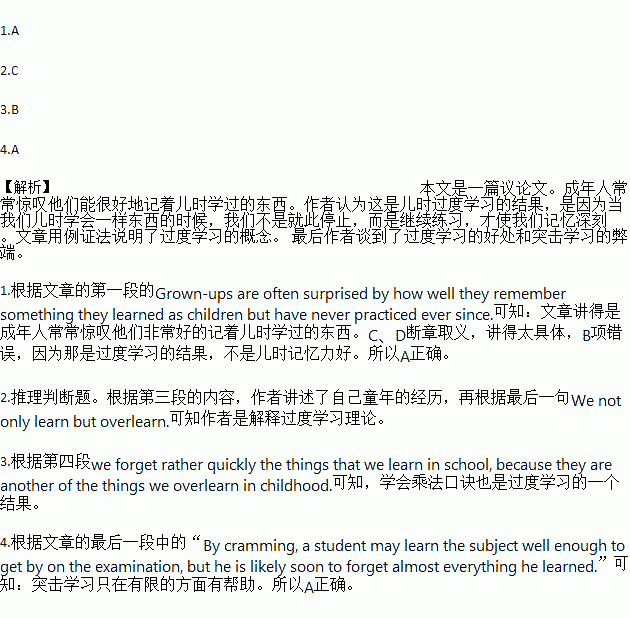题目内容
Grown-ups are often surprised by how well they remember something they learned as children but have never practiced ever since. A man who has not had a chance to go swimming for years can still swim as well as ever when he gets back in the water. He can get on a bicycle after many years and still ride away. A mother who has not thought about the words for years can teach her daughter the poem that begins "Twinkle, twinkle, little star" or remember the story of Cinderella or Goldilocks and the Three Bears.
One explanation is the law of overlearning, which can be stated as follows: Once we have learned something, extra learning attempts or tries to increase the length of time we will remember it.
In childhood we usually continue to practice such skills as swimming, and bicycle riding long after we have learned them. We continue to listen to and remind ourselves of words such as "Twinkle, twinkle, little star" and childhood tales such as Cinderella and Goldilocks. We not only learn but overlearn.
The multiplication tables(乘法口诀表) are an exception(例外) to the general rule that we forget rather quickly the things that we learn in school, because they are another of the things we overlearn in childhood.
The law of overlearning explains why cramming(突击学习)for an examination, though it may result in a passing grade, is not a satisfactory way to learn a college course. By cramming, a student may learn the subject well enough to pass the examination, but he is likely soon to forget almost everything he learned. A little overlearning, on the other hand, is really necessary for one's future development.
1.What is the main idea of paragraph 1?
A. People remember well what they learned in childhood.
B. Children have a better memory than grown-ups.
C. Poem reading is a good way to learn words.
D. Stories for children are easy to remember.
2.The author tells the experience in childhood in order to __________.
A. remember the good old days
B. let readers follow the example
C. explain the law of overlearning
D. help readers understand the importance of knowledge
3.According to the author, being able to use multiplication tables is__________.
A. a step towards studies B. a result of overlearning
C. a special case of cramming D. a skill to deal with math problems
4.What is the author's opinion on cramming?
A. It's helpful only in a limited way. B. It causes failure in college exams.
C. It's possible to result in poor memory. D. It increases students' learning interest.
 新课标同步训练系列答案
新课标同步训练系列答案 一线名师口算应用题天天练一本全系列答案
一线名师口算应用题天天练一本全系列答案
